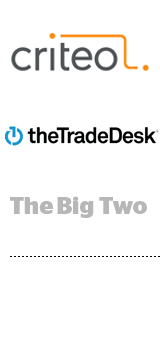
On Monday, Pivotal analyst Brian Wieser informed investors he will begin covering Criteo and The Trade Desk as his first ad tech stocks.
Wieser covers large entities across the media and marketing sectors. His smallest previously was Interpublic Group, which has a $10 billion market cap. But when investors began asking him more about ad tech in the context of behemoths like Google and AT&T, formal coverage became necessary.
“There’s been a significant uptick in investor interest [in ad tech],” he said. “I suspect it has something to do with The Trade Desk performing as well as they have in recent quarters.”
Wieser has also noticed increased trading volumes around ad tech stocks, often a good proxy for investor interest, he said. Investors do have more of a reason to be interested in ad tech, as cross-sector mega-mergers, like AT&T and Time Warner, breed big opportunities for the sector.
“These companies are turning over their shareholder base to a ridiculous amount,” he said. “The Trade Desk trades as much in a day as something like Omnicom.”
While investors are excited about The Trade Desk, which has more than tripled in market value since going public in September 2016, Wieser has a rosier outlook for Criteo, which he calls “undervalued.” Investors soured on Criteo last year when Apple implemented its intelligent tracking protocol, inhibiting retargeting to Safari browsers. GDPR may also come with negative consequences for the company’s cookie-based ad tracking.
“This is a knowingly rough year, and [I think] you’ll get some kind of rebound the following year, unless they’re fundamentally not able to sell media as effectively as they used to,” Wieser said. “We still haven’t seen all of the consequences of GDPR play out, and that will take years, but the risk/reward is acceptable.”
The Trade Desk, on the other hand, is set for rapid short-term growth but will eventually decelerate due to its narrow focus on agencies, Wieser predicts. Despite big ambitions to grow internationally and expand into advanced TV, The Trade Desk hasn’t yet proven its ability to succeed outside of its current market.
“Investors have gotten ahead of themselves by giving them arguably too much credit,” Wieser said. “They can have a great year this year, but they will come back to earth.”
In general, the two companies are more similar than different and offer investors a glimpse into the ad tech sector. Both The Trade Desk and Criteo face the same risks, which Wieser identified as “intensive competition, insecure supply of inventory or long-term spending commitments from advertisers and a range of regulatory risks.”
“Given what they do and the space they’re in, I think they can both be subjected to the same factors,” he said.
This post was syndicated from Ad Exchanger.


More Stories
Island Gelato partners with Impact PR
Meta More Than Doubled Revenue From its AI-Powered Ad Tool
How A Digital Media Agency Built Its Own AI-Powered Contextual Targeting Tool